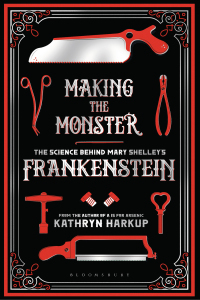Take a photo of a barcode or cover
This is a fantastic insight into Frankenstein, as well as scientific advancements at the time.
informative
slow-paced
Mary Shelley was the biggest badass and I won’t hear any different!!!! She knew her shit to the fullest extent possible and this book proves that without a shadow of a doubt!!! Part biography, part investigation of the truly horrifying quackery scientists and doctors got up to in the 19th century and prior, this was a great read!!! I’m going to approach Frankenstein, one of my all time faves, differently from now on and I’ll be able to appreciate it even more.
Graphic: Child death, Gore, Medical content, Medical trauma, Death of parent
informative
reflective
medium-paced
informative
slow-paced
I absolutely adored Kathryn Harkups' Death By Shakespeare and when I saw this I knew I had to pick it up.
This book is a lot. There is a lot of in depth analysis into science during the 1700-1800's, how it progressed, introductions to the scientists and alchemists at that time, Mary & Percy Shelley's personal lives, and even how science has progressed to this day. It is extremely fact heavy and isn't one that should try and be speed read. Take your time with this book and adore it for what it is.
It was an incredibly interesting read and even going into the book having already studied Frankenstein and knowing a little about Mary Shelley's personal life and some of the science that may have inspired it - I still found so much new stuff that I hadn't already known.
I would recommend this for any one interested in Gothic fiction and the 1700/1800's, as it really does focus so much on science and the Enlightenment that was happening at that time. There's so much that can be taken from it and also applied into other novels.
This book is a lot. There is a lot of in depth analysis into science during the 1700-1800's, how it progressed, introductions to the scientists and alchemists at that time, Mary & Percy Shelley's personal lives, and even how science has progressed to this day. It is extremely fact heavy and isn't one that should try and be speed read. Take your time with this book and adore it for what it is.
It was an incredibly interesting read and even going into the book having already studied Frankenstein and knowing a little about Mary Shelley's personal life and some of the science that may have inspired it - I still found so much new stuff that I hadn't already known.
I would recommend this for any one interested in Gothic fiction and the 1700/1800's, as it really does focus so much on science and the Enlightenment that was happening at that time. There's so much that can be taken from it and also applied into other novels.
dark
informative
reflective
slow-paced
I don't think I realized just how little I knew about Mary Shelley and her husband, Percy Shelley or what was going on around Mary when Frankenstein was being written. Shelley's childhood was chaotic and lacking in any kind of formal education yet she was incredibly curious and well read. What little I knew about Mary Shelley I knew even less about what was going on in scientific world at the time and was very surprised about the number and scope of experiments involving electricity.
This book was fascinating. I had never really thought about putting Frankenstein in historical context and didn't realize just how much that would add to the story. While I found it interesting from the start it took me awhile to get invested in the book. This isn't a nonfiction book that reads like a novel, however, once the book got past Mary's childhood (about 10 - 15%) the pace picked up and I found it a really compelling read.
While this was a really interesting standalone I think it would be even better as companion read to Frankenstein. The book talks quite a bit about influences in the book itself which I think would make Frankenstein a richer and more interesting read. This was a compelling read with an unusual focus and a book that will bring fresh perspective on a classic.
This book was fascinating. I had never really thought about putting Frankenstein in historical context and didn't realize just how much that would add to the story. While I found it interesting from the start it took me awhile to get invested in the book. This isn't a nonfiction book that reads like a novel, however, once the book got past Mary's childhood (about 10 - 15%) the pace picked up and I found it a really compelling read.
While this was a really interesting standalone I think it would be even better as companion read to Frankenstein. The book talks quite a bit about influences in the book itself which I think would make Frankenstein a richer and more interesting read. This was a compelling read with an unusual focus and a book that will bring fresh perspective on a classic.
I found the biographical information about Mary Shelley to be more interesting than the descriptions of 18th century science, but still it is interesting to know the scientific background of the time.
3.5 - I enjoyed the parts about the Shelleys, Byron etc and their travels and heartbreaks and I did enjoy some of the historical context re the Victorians playing around with electricity ! However , there were quite long graphic sections about exactly how Victor Frankenstein might have stitched pieces of dead bodies together and why it wouldn’t have worked - i kept wanting to say ‘yeah I know it wouldn’t have worked
informative
Every man in this book was testing my patience but Mary Shelley remains iconic. Her life will never not be interesting to me.
I really liked this book!
Harkup’s writing is clear and engaging, and the research performed for this book is clearly extensive and thorough. I learned a lot from this book, both about the writing and publication of Frankenstein itself and about how Victor might have approached his great experiment (spoiler alert: I’m now pretty convinced that given the tools and knowledge of the time, it isn’t conceivable to stitch together a functional being out of necrotic material. It isn’t even really possible now, after all. But hey, it’s fiction, so I’ll allow it.)
If you’re a fan of Frankenstein or medical/scientific history, Making the Monster is a fantastic read. Informative, well structured, and well researched, this is a great and detailed overview of how this classic was brought to life—so to speak. ;)
See my full review here: www.righterofwords.com
Harkup’s writing is clear and engaging, and the research performed for this book is clearly extensive and thorough. I learned a lot from this book, both about the writing and publication of Frankenstein itself and about how Victor might have approached his great experiment (spoiler alert: I’m now pretty convinced that given the tools and knowledge of the time, it isn’t conceivable to stitch together a functional being out of necrotic material. It isn’t even really possible now, after all. But hey, it’s fiction, so I’ll allow it.)
If you’re a fan of Frankenstein or medical/scientific history, Making the Monster is a fantastic read. Informative, well structured, and well researched, this is a great and detailed overview of how this classic was brought to life—so to speak. ;)
See my full review here: www.righterofwords.com







